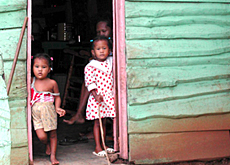
Research enriches Swiss development aid

Swiss researchers have teamed up with scientists from across the developing world to devise new ways of improving conditions in poorer countries.
The programme, which has an initial four-year budget of SFr32.6 million ($25.4 million), is seen as an essential part of Switzerland’s development aid strategy.
Leading Swiss institutions, such as the Swiss Tropical Institute in Basel and the Graduate Institute of Development Studies in Geneva, are taking part in the initiative.
They are working closely with counterparts based in regions such as the Horn of Africa, Central Asia and South America.
Altogether around 400 scientists from Switzerland, Latin America, Africa and Asia are involved in eight projects ranging from natural resources and ecology through to environmental sanitation and health.
“Developing countries also have a right to education funding,” said Hans Hürni, director of the National Centre of Competence in Research (NCCR) North-South.
“For example, in black Africa there is one-500th the money available for research per inhabitant as there is in Switzerland,” he added.
“The education budget of Ethiopia, with its population of 65 million, is about the same as the budget of Bern University.”
The NCCR North-South, which was launched three years ago, is one of 14 long-term research programmes implemented by the Swiss National Science Foundation.
Direct benefits
By boosting education funding, the NCCR North-South hopes to make a lasting contribution to improving the situation in developing countries.
“To encourage young researchers and institutions in the southern partner countries is one of the priorities of the NCCR programme,” Heidi Diggelmann, president of the Swiss National Science Foundation’s Research Council, told swissinfo.
“The feedback is very positive. The partnership is working well, and the contacts between our researchers and those in the South are excellent.”
She added that a network established among researchers in developing countries was an additional bonus.
Shared knowledge
The programme is also being funded by the Swiss Agency for Development and Cooperation (SDC), which believes that balanced scientific cooperation can lead to fairer access to information.
“The lack of access to science is leading the countries of the South and the East into a growing dependence on the industrialised nations,” warned Walter Fust, head of the SDC.
Fust claims that the pooling of information is also one of the keys to better mutual understanding between the North and South.
“Intercultural expertise is enormously important and for that you need ‘infonauts’ not astronauts,” he said.
Local partners
According to Dora Rapold, head of the SDC’s Thematic and Technical Resources Department, the programme is also designed to strengthen local partners.
“That is a prerequisite if the NCCR programme is to bear fruit,” she told swissinfo.
“That means white men do not simply go to Africa, but it is the Africans living there who also bring about results.”
Rapold added that the SDC was trying to use synergies from the NCCR programme for its own development programmes.
Noah Adamty, a doctorate student from the University of Ghana, is encouraged by the NCCR initiative.
Adamty, who is taking part in an exchange programme with Basel’s Tropical Institute, was one of 200 researchers who attended a recent conference in Switzerland.
“I have benefited from the programme,” he said. “I will now put the many important experiences I have gained to use in my own country.”
swissinfo, Jean-Michel Berthoud
The NCCR North-South programme began in 2001 and is designed to run for 12 years.
375 people from Switzerland, Latin America, Africa and Asia are involved, including 86 doctorate students.
A budget of SFr32.6 million ($25.4 million) was authorised for the first four years of the programme.
Researchers in Switzerland are financed by a contribution from the institution where they are studying and by the Swiss National Science Foundation.
Partners in the developing world receive funding from the Swiss Agency for Development and Cooperation.
The NCCR North-South is one of the 14 long-term research programmes implemented by the Swiss National Science Foundation.

In compliance with the JTI standards
More: SWI swissinfo.ch certified by the Journalism Trust Initiative




























You can find an overview of ongoing debates with our journalists here . Please join us!
If you want to start a conversation about a topic raised in this article or want to report factual errors, email us at english@swissinfo.ch.